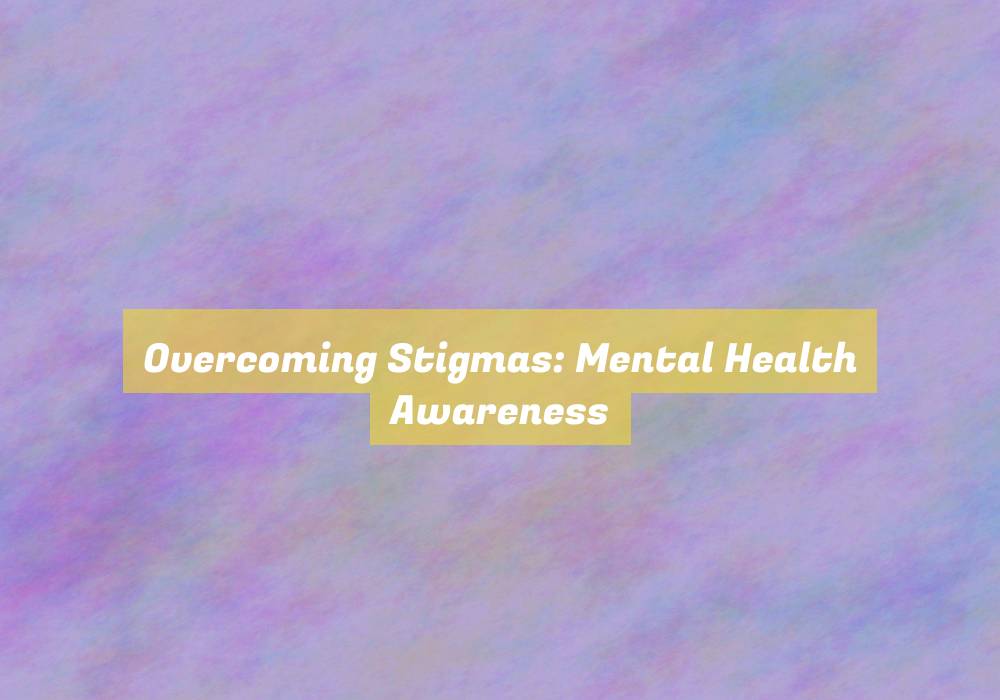Overcoming Stigmas: Mental Health Awareness
YouG??ve likely encountered the pervasive stigma surrounding mental health at some point in your life, whether through media portrayals, societal attitudes, or personal experiences.
However, itG??s essential to recognize the detrimental impact of these stigmas and the urgent need to address them.
By understanding the roots of these stigmas, exploring their effects on individuals and communities, and discovering effective strategies for combatting them, we can pave the way for a more supportive and inclusive environment for everyone.
Understanding Mental Health Stigmas
Understanding mental health stigmas can significantly impact how individuals seek treatment and support for their mental well-being. When you encounter stigmatizing attitudes or beliefs about mental health, it may lead you to feel ashamed or reluctant to seek help. These stigmas can create barriers to accessing necessary support and treatment, causing you to suffer in silence.
ItG??s important for you to recognize that mental health conditions are legitimate medical concerns and seeking help is a sign of strength, not weakness. By understanding and challenging stigmas, you can empower yourself and others to break free from the misconceptions and seek the assistance needed for mental well-being.
Additionally, when you actively work to dispel stigmas, you contribute to creating a more supportive and understanding environment for everyone. By addressing these stigmas, you can help create a world where seeking mental health support is seen as a positive and proactive step towards overall well-being.
Impact of Stigma on Communities
Encountering stigmatizing attitudes or beliefs about mental health not only affects individuals seeking help but also has far-reaching effects on communities as a whole. When stigmas surrounding mental health prevail, it creates a culture of silence and shame within communities. This can lead to reduced rates of individuals seeking treatment, as they may fear judgment or discrimination. Consequently, untreated mental health issues can escalate and negatively impact the overall well-being of the community, including increased rates of substance abuse, unemployment, homelessness, and even crime.
Moreover, the impact of mental health stigmas on communities extends to economic repercussions. When individuals donG??t seek treatment due to fear of stigma, it results in decreased productivity and higher healthcare costs for the community. Additionally, the perpetuation of stigmas can hinder the implementation of supportive policies and resources, further exacerbating the mental health crisis within the community.
Ultimately, the impact of mental health stigmas on communities is profound and pervasive, affecting not only the individuals directly impacted but also the overall health, productivity, and cohesiveness of the community as a whole. Addressing and overcoming these stigmas is essential for the well-being and prosperity of communities.
Strategies for Breaking Stigma
To break the stigma surrounding mental health in your community, consider initiating open and honest conversations about mental health. By sharing personal experiences or discussing the prevalence of mental health issues, you can help others understand that itG??s a common and natural part of life. Encourage others to speak up and share their stories, as this can help normalize the conversation around mental health.
Another strategy is to educate yourself and others about mental health. By understanding the facts and myths surrounding mental health, you can help dispel misconceptions and reduce stigma. Share reliable information from reputable sources and encourage others to do the same.
Furthermore, be mindful of the language you use when discussing mental health. Avoid using derogatory terms or making jokes about mental illness, as this can contribute to stigma. Instead, use respectful and inclusive language that acknowledges the challenges individuals with mental health conditions face.
Lastly, support initiatives and organizations that promote mental health awareness and advocate for change. By actively participating in these efforts, you can help create a more supportive and understanding community for those affected by mental health conditions.
Fostering Supportive Environments
Creating a culture of empathy and understanding is essential in fostering supportive environments for individuals dealing with mental health challenges. It starts with actively listening to those struggling and offering non-judgmental support. Acknowledge their experiences and emotions, letting them know that itG??s okay to not be okay. Encourage open conversations about mental health, and be mindful of the language used to avoid perpetuating stigmas. Educate yourself and others about different mental health conditions to promote understanding and reduce misconceptions.
Promote inclusivity and acceptance within your community or workplace. Encourage policies that support mental well-being, such as flexible work arrangements or mental health days. Foster an environment where seeking help is seen as a sign of strength, not weakness. Advocate for access to mental health resources and services, ensuring that individuals in need can easily seek professional help without fear of judgment.
Above all, be a supportive ally. Offer a helping hand or a listening ear, and check in on those around you. Small acts of kindness and understanding can make a significant difference in someoneG??s mental health journey. Together, we can create environments where individuals feel supported and empowered to prioritize their mental well-being.
Conclusion
YouG??ve learned about the damaging effects of mental health stigmas and the importance of breaking them down. By fostering supportive environments and promoting awareness, we can create a more understanding and compassionate society.
ItG??s up to us to challenge stigmas and provide support for those struggling with mental health. Together, we can make a positive impact and improve the well-being of individuals and communities.
Keep the conversation going and continue to advocate for mental health awareness.
